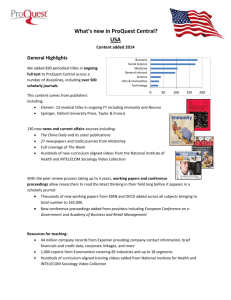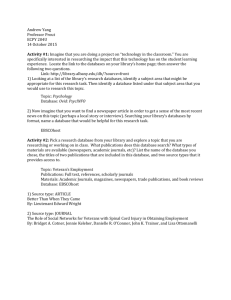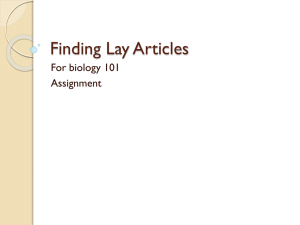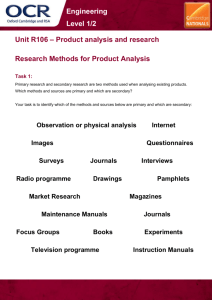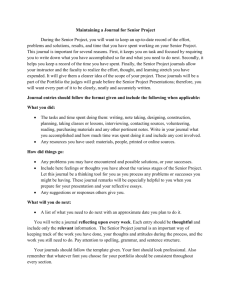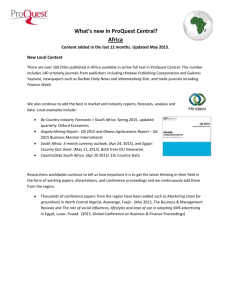Submission of 2009 SAPSE Accredited Publications
advertisement
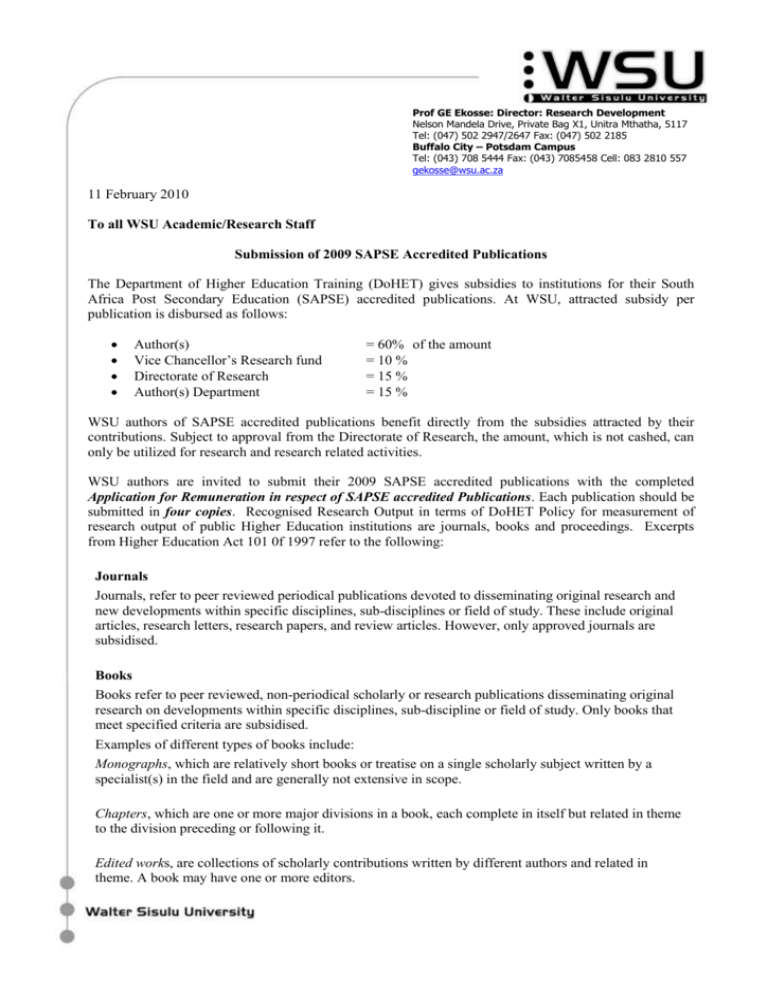
Prof GE Ekosse: Director: Research Development Nelson Mandela Drive, Private Bag X1, Unitra Mthatha, 5117 Tel: (047) 502 2947/2647 Fax: (047) 502 2185 Buffalo City – Potsdam Campus Tel: (043) 708 5444 Fax: (043) 7085458 Cell: 083 2810 557 gekosse@wsu.ac.za 11 February 2010 To all WSU Academic/Research Staff Submission of 2009 SAPSE Accredited Publications The Department of Higher Education Training (DoHET) gives subsidies to institutions for their South Africa Post Secondary Education (SAPSE) accredited publications. At WSU, attracted subsidy per publication is disbursed as follows: Author(s) Vice Chancellor’s Research fund Directorate of Research Author(s) Department = 60% of the amount = 10 % = 15 % = 15 % WSU authors of SAPSE accredited publications benefit directly from the subsidies attracted by their contributions. Subject to approval from the Directorate of Research, the amount, which is not cashed, can only be utilized for research and research related activities. WSU authors are invited to submit their 2009 SAPSE accredited publications with the completed Application for Remuneration in respect of SAPSE accredited Publications. Each publication should be submitted in four copies. Recognised Research Output in terms of DoHET Policy for measurement of research output of public Higher Education institutions are journals, books and proceedings. Excerpts from Higher Education Act 101 0f 1997 refer to the following: Journals Journals, refer to peer reviewed periodical publications devoted to disseminating original research and new developments within specific disciplines, sub-disciplines or field of study. These include original articles, research letters, research papers, and review articles. However, only approved journals are subsidised. Books Books refer to peer reviewed, non-periodical scholarly or research publications disseminating original research on developments within specific disciplines, sub-discipline or field of study. Only books that meet specified criteria are subsidised. Examples of different types of books include: Monographs, which are relatively short books or treatise on a single scholarly subject written by a specialist(s) in the field and are generally not extensive in scope. Chapters, which are one or more major divisions in a book, each complete in itself but related in theme to the division preceding or following it. Edited works, are collections of scholarly contributions written by different authors and related in theme. A book may have one or more editors. Proceedings Proceedings refer to a published record of a conference, congress, symposium or other meeting whose purpose is to disseminate original research and new developments within specific disciplines, subdisciplines or field of study. Only proceedings that meet specified criteria are subsidized. 4. Criteria for Recognised Research Output Recognised research output meeting specified criteria are eligible for subsidisation. Below are the criteria for subsidising output of journals, books and proceedings. Journals Journals must meet the following minimum criteria to be eligible for inclusion in the list of approved journals: a) The purpose of the journal must be to disseminate research results and the content must support high level learning, teaching and research in the relevant subject area b) c) Articles accepted for publication in the journal must be peer reviewed The majority of contributions to the journal must be beyond a single institution d) The journal must have an International Standard Serial Number (ISSN) e) The journal must be published regularly f) The journal must have an editorial board that includes members beyond a single institution and is reflective of expertise in the relevant subject area g) The journal must be distributed beyond a single institution For purposes of subsidy, only qualifying journals in the following categories are recognised: 1) 2) Journals appearing in the following international indices are included in the list of approved journals; a) The Sciences Citation Index of the Institute of Scientific Information (ISI) b) The Social Sciences Citation Index of the ISI c) The Arts and Humanities Citation Index of the ISI d) The International Bibliography of Social Sciences (IBSS) South African journals not appearing in the above indices, but whose seat of publication is in South Africa and which meet the above minimum criteria are also included in the list of approved journals. These journals are included in a separate index of Approved South African Journals maintained by the Department of Education (DOE) and subject to an annual review. South African journals are encouraged to adopt a policy of including abstracts in English if the language of the journal is not in English. This will facilitate possible inclusion of the journal in international indices such as the ISI and the IBSS. 2 The following types of articles appearing in journals are not subsidised. a) Correspondence to the editors b) Abstracts or extended abstracts c) Obituaries d) e) Book reviews News articles f) Advertorials Books and Proceedings The Department of Education establishes for each reporting year, an evaluation panel of senior professionals from the higher education community to evaluate all books and proceedings submitted by claiming institutions. In the event that either the book or proceedings is published in a language either than English, the institution must submit a summary of the output in English with a minimum of one page for books and an abstract for proceedings. Similarly, any supporting evidence or documentation must also be provided in English. The minimum contribution from a book that will be considered for evaluation will be a complete division of a book such as a chapter. The independent panel evaluates books and proceedings together with the relevant accompanying information individually prior to recommending the allocation of units for each book or proceeding based on the following minimum criteria. Books a) b) The purpose of the book must be to disseminate original research and new developments within specific disciplines, sub-disciplines or field of study The book must be peer reviewed as a research output and supporting evidence provided in the book or from the publishers c) d) The book must have an ISBN number The length of the book must be a minimum of 60 pages, excluding references, bibliography, appendices, this being above the minimum norm of 49 pages proposed by the UNESCO definition of a book as a non-periodical literary publication consisting of 49 or more pages, covers excluded e) The target audience of the book must be specialists in the relevant field. The following types of book publications are not subsidised; a) Dissertations and theses b) Text books and study guides c) Inaugural speeches d) Reports forming part of contract research e) Works of fiction Proceedings a) The purpose of the proceedings must be to disseminate original research and new developments within specific disciplines, sub-disciplines or field of study b) Articles accepted for publication in the proceedings must be peer reviewed 3 c) d) The proceedings must have an ISBN number The target audience of the proceedings must be specialists in the relevant field Where proceedings are published in an approved journal, the output will be treated as a journal article. The following types of articles appearing in proceedings are not subsidised. a) Correspondence to the editors b) Abstracts or extended abstracts c) Obituaries d) Book reviews e) News articles f) Advertorials g) Previously published material The Directorate of Research Development could be contacted on issues related to SAPSE-accredited contributions. Submissions should be delivered to Ms Penny Dawson at the Directorate of Research Development at NMD on or before 20 March 2010. For ease of administration, each submission will be registered and a letter of acknowledgement issued. Prof GE Ekosse Director: Research Development 4 5
